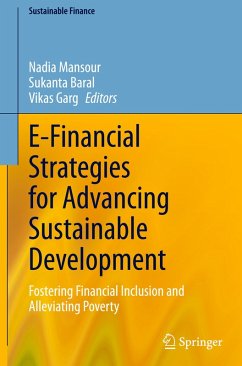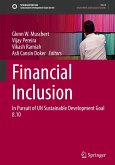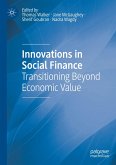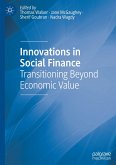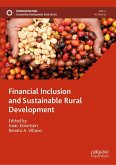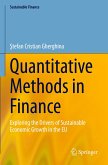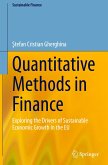E-Financial Strategies for Advancing Sustainable Development
Fostering Financial Inclusion and Alleviating Poverty
Herausgegeben:Mansour, Nadia; Baral, Sukanta; Garg, Vikas
E-Financial Strategies for Advancing Sustainable Development
Fostering Financial Inclusion and Alleviating Poverty
Herausgegeben:Mansour, Nadia; Baral, Sukanta; Garg, Vikas
- Gebundenes Buch
- Merkliste
- Auf die Merkliste
- Bewerten Bewerten
- Teilen
- Produkt teilen
- Produkterinnerung
- Produkterinnerung
This book offers insights how to foster financial inclusion and combat poverty in alignment with the first UN Sustainable Development Goal (SDG), which pledges 'No Poverty'. From describing and analysing e-financial tools to providing tailored strategies for financial inclusion, this book equips readers with actionable knowledge to drive positive change. The contributions explore the synergy between cutting-edge digital finance with all the newest technological innovations and the pursuit of a poverty-free world. Readers will learn how to implement e-financial strategies for sustainable…mehr
Andere Kunden interessierten sich auch für
![Financial Inclusion Financial Inclusion]() Financial Inclusion134,99 €
Financial Inclusion134,99 €![Gen Z's Financial Advisory Preferences Gen Z's Financial Advisory Preferences]() Saul M. SpanglerGen Z's Financial Advisory Preferences15,00 €
Saul M. SpanglerGen Z's Financial Advisory Preferences15,00 €![Innovations in Social Finance Innovations in Social Finance]() Innovations in Social Finance127,99 €
Innovations in Social Finance127,99 €![Innovations in Social Finance Innovations in Social Finance]() Innovations in Social Finance127,99 €
Innovations in Social Finance127,99 €![Financial Inclusion and Sustainable Rural Development Financial Inclusion and Sustainable Rural Development]() Financial Inclusion and Sustainable Rural Development149,99 €
Financial Inclusion and Sustainable Rural Development149,99 €![Quantitative Methods in Finance Quantitative Methods in Finance]() Stefan Cristian GherghinaQuantitative Methods in Finance82,99 €
Stefan Cristian GherghinaQuantitative Methods in Finance82,99 €![Quantitative Methods in Finance Quantitative Methods in Finance]() Stefan Cristian GherghinaQuantitative Methods in Finance82,99 €
Stefan Cristian GherghinaQuantitative Methods in Finance82,99 €-
-
-
This book offers insights how to foster financial inclusion and combat poverty in alignment with the first UN Sustainable Development Goal (SDG), which pledges 'No Poverty'. From describing and analysing e-financial tools to providing tailored strategies for financial inclusion, this book equips readers with actionable knowledge to drive positive change. The contributions explore the synergy between cutting-edge digital finance with all the newest technological innovations and the pursuit of a poverty-free world. Readers will learn how to implement e-financial strategies for sustainable economic growth and social progress. The book is a must-read for policymakers, economists, and anyone dedicated to shaping a better future for all.
Produktdetails
- Produktdetails
- Sustainable Finance
- Verlag: Springer / Springer Nature Switzerland / Springer, Berlin
- Artikelnr. des Verlages: 978-3-031-67522-5
- Seitenzahl: 412
- Erscheinungstermin: 30. Oktober 2024
- Englisch
- Abmessung: 241mm x 160mm x 28mm
- Gewicht: 725g
- ISBN-13: 9783031675225
- ISBN-10: 3031675223
- Artikelnr.: 71166335
- Herstellerkennzeichnung
- Springer-Verlag KG
- Sachsenplatz 4-6
- 1201 Wien, AT
- ProductSafety@springernature.com
- Sustainable Finance
- Verlag: Springer / Springer Nature Switzerland / Springer, Berlin
- Artikelnr. des Verlages: 978-3-031-67522-5
- Seitenzahl: 412
- Erscheinungstermin: 30. Oktober 2024
- Englisch
- Abmessung: 241mm x 160mm x 28mm
- Gewicht: 725g
- ISBN-13: 9783031675225
- ISBN-10: 3031675223
- Artikelnr.: 71166335
- Herstellerkennzeichnung
- Springer-Verlag KG
- Sachsenplatz 4-6
- 1201 Wien, AT
- ProductSafety@springernature.com
Dr. Nadia Mansour is a finance doctor. She is an assistant at The University of Sousse-Tunisia, a visiting researcher, and a post-doctor at the University of Salamanca- Spain. Dr. Nadia is an expert in sustainable finance at UNDP. She is a trainer at CREACT4MED, a trainer of trainers with USAID Job and Erasmus. Her research interests focus on Finance, sustainable development, and Innovation. She is an academic member and ambassador of the Communication Institute of Greece, a conference chairperson, a committee member of indexed conferences, an Editorial Board Member of IGI GLOBAL, Taylor & Francis, and Springer, a reviewer in IGI Global, Emerald, and Wiley. She has presented various scientific papers at international (France, Morocco, USA, Turkey) and national conferences. She is also a keynote speaker and session chair at several conferences in Turkey, India, UAE, and Spain. She has several published articles in ranked journals and chapters (IGI Global, Emerald, Springer, Palgrave Macmillan) and edited books (Taylor & Francis, Springer, IGI Global, Emerald). Prof. Sukanta Baral has 28 years of experience in academia by holding several positions at various levels and working as Professor at the Faculty of Commerce & Management at Indira Gandhi National Tribal University (A Central University Government of India), Amarkantak, India. He has been conferred with 30 National and International Awards and is the Chief Editor of the 'Splint International Journal of Professionals', a Quarterly Peer Reviewed Multidisciplinary Journal. His contributions are a valuable resource for practitioners, researchers and scholars interested in multidisciplinary dynamics and the evolving role of business in society Vikas Garg, PhD, working as an Associate Professor of Management at Christ University, India. He has more than 20 years of experience with over 10 PhD scholars under his guidance. He has published numerous research papers in various Scopus- and ABDC-indexed international and national journals. He is acting as Associate Editor of the Journal of Sustainable Finance and Investment (indexed in the WoS and Scopus). He is also acting as the Book Series Editor with Taylor and Francis for three books series: Technology Innovations: Strategies for Business Sustainability and Growth; Emerging Trends in Technology in Management and Commerce; and Electronic Commerce Management for Business. He has been working with new innovative ideas in the field of patents and copyrights. He has been the lead organizer in conducting various international conferences, workshops, and case study competitions, including those affiliated with IEEE. He has been conferred with many national and international awards for being best academician, researcher, and employee.
Chapter 1. Unlocking the Secrets of Invisible Banking in India: A Comprehensive Exploration.- Chapter 2. Digital Payments Strategies for Financial Inclusion.- Chapter 3. Understanding the Insinuable Role of Financial Inclusion and E-financial Strategies as an Unparallel Approach for Poverty Alleviation and Building Inclusive Society.- Chapter 4. Analysing India's Sustainable Growth From the Lens of Financial Inclusion: An Empirical Investigation in Tribal District of Odisha.- Chapter 5. Financial Literacy and Education in Enhancing Financial Inclusion.- Chapter 6. Financial Inclusion and Reduction of Poverty in India.- Chapter 7. Barriers to Comprehensive Financial Inclusion Across the Globe: From Socio-cultural Norms to Systemic Challenges.- Chapter 8. Financial Literacy and Education in Enhancing Financial Inclusion and Poverty Alleviation.- Chapter 9. Fintech for Fostering Financial Inclusion and Sustainable Development: An Analysis of User Pattern and Issues in the Context of Far East India.- Chapter 10. Transformative Trends in Digital Banking: Exploring E-banking, Mobile Banking, Digital Payments, and Innovative Solutions.- Chapter 11. Exploring the Antecedents of Financial (Il-)literacy Among African Women.- Chapter 12. Futuristic Digital Banking and E-financial Strategies Stimulating Financial Inclusion: Satellite SDG-1 Alleviating Poverty Compliance Sustainable Development Lensing Global Perspectives.- Chapter 13. Role of Mobile Banking in Financial Inclusion - Key Challenges and Barriers.- Chapter 14. E-financial Strategies as a Catalyst for Poverty Alleviation and Financial Inclusion.- Chapter 15. Reaching Sustainable Development Goals: the Contribution of Finance.- Chapter 16. Women's Financial Literacy and Financial Inclusion Post-pandemic.- Chapter 17. Technological Innovations and Their Impact on Financial Inclusion.- Chapter 18. E-financial Strategies for Sustainable Development- Empirical Evidence From India.- Chapter 19. Digital Financial Inclusion: Evidence From India.- Chapter 20. Impact of Financial Inclusion for Achieving the Sustainable Development for Removing Poverty in All Forms: A Review Study From India.- Chapter 21. Interplay of Intellectual Property Rights, Technological Innovation and Sustainable Food Security: a Comprehensive Analysis.- Chapter 22. Greentech Guardians: Navigating the Fintech Cybersecurity Labyrinth for Sustainable Solutions.- Chapter 23. AI and Banking Sector: Impact and Risk.
Chapter 1. Unlocking the Secrets of Invisible Banking in India: A Comprehensive Exploration.- Chapter 2. Digital Payments Strategies for Financial Inclusion.- Chapter 3. Understanding the Insinuable Role of Financial Inclusion and E-financial Strategies as an Unparallel Approach for Poverty Alleviation and Building Inclusive Society.- Chapter 4. Analysing India's Sustainable Growth From the Lens of Financial Inclusion: An Empirical Investigation in Tribal District of Odisha.- Chapter 5. Financial Literacy and Education in Enhancing Financial Inclusion.- Chapter 6. Financial Inclusion and Reduction of Poverty in India.- Chapter 7. Barriers to Comprehensive Financial Inclusion Across the Globe: From Socio-cultural Norms to Systemic Challenges.- Chapter 8. Financial Literacy and Education in Enhancing Financial Inclusion and Poverty Alleviation.- Chapter 9. Fintech for Fostering Financial Inclusion and Sustainable Development: An Analysis of User Pattern and Issues in the Context of Far East India.- Chapter 10. Transformative Trends in Digital Banking: Exploring E-banking, Mobile Banking, Digital Payments, and Innovative Solutions.- Chapter 11. Exploring the Antecedents of Financial (Il-)literacy Among African Women.- Chapter 12. Futuristic Digital Banking and E-financial Strategies Stimulating Financial Inclusion: Satellite SDG-1 Alleviating Poverty Compliance Sustainable Development Lensing Global Perspectives.- Chapter 13. Role of Mobile Banking in Financial Inclusion - Key Challenges and Barriers.- Chapter 14. E-financial Strategies as a Catalyst for Poverty Alleviation and Financial Inclusion.- Chapter 15. Reaching Sustainable Development Goals: the Contribution of Finance.- Chapter 16. Women's Financial Literacy and Financial Inclusion Post-pandemic.- Chapter 17. Technological Innovations and Their Impact on Financial Inclusion.- Chapter 18. E-financial Strategies for Sustainable Development- Empirical Evidence From India.- Chapter 19. Digital Financial Inclusion: Evidence From India.- Chapter 20. Impact of Financial Inclusion for Achieving the Sustainable Development for Removing Poverty in All Forms: A Review Study From India.- Chapter 21. Interplay of Intellectual Property Rights, Technological Innovation and Sustainable Food Security: a Comprehensive Analysis.- Chapter 22. Greentech Guardians: Navigating the Fintech Cybersecurity Labyrinth for Sustainable Solutions.- Chapter 23. AI and Banking Sector: Impact and Risk.

